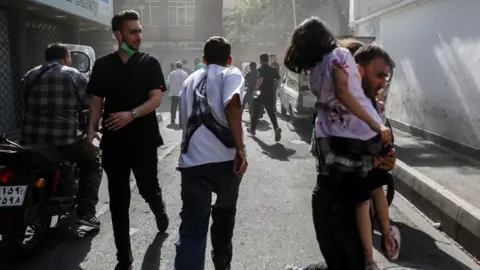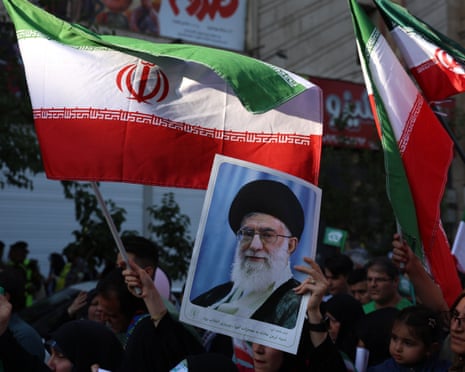The Middle East is witnessing one of its most volatile periods in recent history as the Iran-Israel conflict enters a new and dangerous phase. Over the past week, both nations have exchanged devastating missile strikes and air raids, resulting in hundreds of casualties and widespread destruction. The situation has drawn urgent attention from world leaders, with the G7 summit placing the crisis at the top of its agenda. As the violence intensifies, the risk of broader regional escalation and humanitarian catastrophe looms large, leaving millions across the region and the world anxiously watching for any sign of de-escalation.
The Iran-Israel conflict has rapidly become the most pressing security crisis in the Middle East, with both nations locked in a deadly cycle of retaliation. As missile sirens wail in Tel Aviv and Haifa, and airstrikes rock Tehran, ordinary citizens on both sides have been thrust into a state of constant fear and uncertainty. Families in Iran have been forced to seek shelter in underground bunkers, while Israeli parents rush their children to fortified safe rooms at the sound of each alarm. The psychological toll is immense, as the threat of sudden violence looms over daily life.
International markets have responded with volatility, as oil prices surge and investors brace for further instability. The Strait of Hormuz, a vital artery for global energy supplies, has seen a sharp increase in naval patrols and insurance premiums, raising concerns about the conflict’s impact on the world economy. Major airlines have suspended flights over Iranian and Israeli airspace, further isolating the region and complicating efforts to deliver humanitarian aid.
Diplomatic channels remain strained, with backdoor negotiations reportedly underway between the United States, European Union, and regional powers such as Turkey and Qatar. However, public statements from both Tehran and Jerusalem remain defiant. Iranian officials insist they are acting in self-defense against “Zionist aggression,” while Israeli leaders argue that preemptive action is necessary to prevent Iran from acquiring nuclear weapons and threatening Israeli security.
The role of regional proxies has added another layer of complexity to the conflict. Hezbollah in Lebanon and various Iranian-backed militias in Syria and Iraq have issued statements of solidarity with Tehran, raising fears of a multi-front war. Israeli defense forces have increased their alert level along the northern border, preparing for possible rocket attacks from Hezbollah or incursions by other militant groups.
Iran-Israel Conflict: Relentless Strikes and Rising Toll
The latest hostilities erupted after Israel launched a series of preemptive airstrikes on Iranian military and nuclear sites, claiming to disrupt Iran’s alleged weapons programs and deter further aggression. Iran responded with a barrage of over 100 ballistic missiles targeting major Israeli cities, including Tel Aviv and Haifa. The attacks have resulted in significant loss of life on both sides, with Iran reporting at least 224 deaths—most of them civilians—and Israel confirming dozens of fatalities and hundreds of injuries. Hospitals in Tehran and Tel Aviv are overwhelmed, and both countries have declared states of emergency as air raid sirens and explosions become a daily reality for millions.
Inside Iran, the government has imposed strict controls on media coverage, but images and videos shared on social media reveal the extent of the devastation. Hospitals are overcrowded, and medical supplies are running dangerously low. Volunteers and aid workers are struggling to reach the hardest-hit neighborhoods, as ongoing airstrikes and roadblocks impede their progress. The Iranian Red Crescent has issued urgent appeals for international assistance, warning that the health system is on the brink of collapse.
In Israel, the Iron Dome missile defense system has intercepted many incoming projectiles, but the sheer volume of attacks has overwhelmed the system at times. Some missiles have struck residential areas, causing casualties and extensive property damage. Emergency services are stretched thin, and the government has called up reserve units to bolster civil defense and maintain public order.
The United Nations Security Council has convened multiple emergency sessions, but divisions among the permanent members have hampered efforts to pass a unified resolution. Russia and China have called for restraint on all sides, while the United States and several European countries have emphasized Israel’s right to self-defense. The lack of consensus has frustrated humanitarian organizations, who argue that immediate action is needed to protect civilians and prevent further escalation.


Religious leaders across the region have called for peace, urging both governments to consider the suffering of innocent people. Interfaith groups in Jerusalem, Tehran, and beyond have organized prayer vigils and peace marches, hoping to pressure political leaders into pursuing dialogue rather than destruction. However, the voices of moderation have so far been drowned out by the rhetoric of war.
Regional and Global Fallout: G7 Leaders Scramble for Solutions
The escalating conflict has dominated discussions at the G7 summit in Canada. Leaders from the United States, Germany, France, and other major powers have called for immediate restraint and a return to diplomatic dialogue. German Chancellor Friedrich Merz emphasized the need to halt Iran’s nuclear ambitions while affirming Israel’s right to self-defense. Meanwhile, US President Donald Trump insisted that the US is not directly involved in Israel’s military actions but warned of severe consequences if American interests are threatened. The United States Embassy in Tel Aviv suffered minor damage from Iranian missile strikes, underlining the risk of the conflict drawing in outside powers.
The conflict has also exposed deep divisions within both Iranian and Israeli societies. In Iran, anti-government protests have erupted in some cities, with demonstrators blaming the regime for provoking the conflict and failing to protect civilians. In Israel, debates rage over the government’s handling of the crisis, with some citizens demanding a more aggressive response and others calling for immediate negotiations to prevent further bloodshed.
Social media has played a pivotal role in shaping public perceptions of the conflict. Hashtags related to the Iran-Israel war have trended globally, with users sharing firsthand accounts, graphic images, and calls for peace. Misinformation and propaganda have also proliferated, complicating efforts to verify facts and understand the true scope of the crisis.
The economic impact of the conflict is already being felt across the region. In Iran, the rial has plummeted to record lows, and inflation is soaring as supply chains are disrupted. In Israel, tourism has ground to a halt, and businesses in affected cities are struggling to stay afloat. Both governments face mounting pressure to address the economic fallout, even as they pour resources into the ongoing military campaign.
Children are among the most vulnerable victims of the conflict. Schools in Tehran, Tel Aviv, and other cities have been closed indefinitely, and many families have been displaced from their homes. Humanitarian organizations warn that the long-term psychological effects on children could be severe, with trauma, anxiety, and loss becoming defining features of a generation.
Humanitarian Crisis: Civilians Trapped Amid Airstrikes and Evacuations
The human toll of the conflict is mounting rapidly. In Iran, mass evacuations are underway in parts of Tehran, with traffic jams and panic as residents flee targeted districts. Israeli civilians are also living under constant threat, seeking shelter from incoming missiles and coping with frequent power outages. Both governments accuse each other of targeting civilian infrastructure, while international aid agencies warn of a looming humanitarian disaster. The closure of borders and airspace across the region has made it difficult for relief organizations to deliver aid, and the United Nations has called for the establishment of safe corridors to allow for medical evacuations and humanitarian assistance.
International calls for a ceasefire have grown louder, with the Pope, the UN Secretary-General, and leaders from the African Union and ASEAN all urging an immediate halt to hostilities. Despite these appeals, both Iran and Israel have set strict preconditions for negotiations, making a diplomatic breakthrough unlikely in the near term.
The risk of the conflict spreading to neighboring countries remains high. Jordan and Egypt have reinforced their borders, while Saudi Arabia and the Gulf states are closely monitoring the situation. Any miscalculation or accidental strike could draw additional actors into the fray, potentially igniting a regional conflagration.
Cyber warfare has emerged as a new front in the conflict, with both Iran and Israel targeting each other’s critical infrastructure. Reports of power outages, disruptions to banking systems, and attacks on government websites have surfaced, highlighting the growing importance of cyber capabilities in modern warfare.


The conflict has also affected the global Jewish and Iranian diasporas, with rallies and protests taking place in major cities around the world. Community leaders have called for solidarity and support for those affected, while also condemning the violence and urging their home governments to pursue peace.
As the fighting continues, the world watches anxiously for signs of de-escalation. Analysts warn that the longer the conflict drags on, the harder it will be to rebuild trust and restore stability in the region. The scars left by this war—physical, emotional, and political—are likely to endure for years to come.
No End in Sight: Leaders Double Down as Fears of Regional War Grow
Despite mounting international pressure, neither Iran nor Israel appears willing to back down. Iranian leaders have vowed continued retaliation until Israeli strikes cease, while Israeli officials have threatened further escalation, including the possibility of targeting Iran’s top leadership. Military analysts warn that the current cycle of attacks could spiral into a broader regional conflict, drawing in neighboring countries and global powers. As the world watches with growing alarm, the urgent need for diplomacy and restraint has never been clearer, yet the path to peace remains perilously uncertain.
Follow: News on Air
Also Read: 5 Explosive Claims and a Stunning Denial: Asim Munir, US Military Parade, and the Diplomatic Storm


